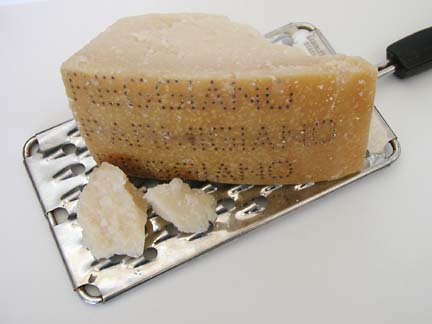
Eleanor Nakama-Mitsunaga

|
Among the world's cheeses, Parmigiano reggiano is probably the most imitated (or bastardized, as one cheese expert puts it). True Parmigiano is not the powdery Parmesan cheese shaken out of a green cardboard tube, but rather is one of the oldest and finest cheeses of Italy.It is an artisan cheese, made for centuries by craftsmen in a particular region, under strict guidelines to ensure quality.
The basics: Parmigiano reggiano comes from the Emilia region of Italy, where it has been made for more than seven centuries -- seven days a week, 52 weeks a year, with no holidays.
It is so important to the region that a consorzio, or consortium, protects its authenticity and quality. Cheesemakers aren't considered worthy until they have 10 to 14 years of apprenticeship.
Parmigiano reggiano is a hard cow's-milk cheese that has been allowed to age 18 to 24 months. The cheese is made into large wheels that are carefully monitored, turned and wiped to ensure proper aging.
The flavor of Parmigiano is rich and robust, the texture creamy yet a bit grainy or crackly at the same time. Because it is an artisan cheese, the flavors vary depending on season, area of production and the cow's milk that produced the cheese.
Selecting: Parmigiano reggiano is generally sold in small blocks or pieces, ideally with part of the rind, with its signature branding, so you know it's authentic.
The color should be uniform, ranging from creamy to deep yellow, depending on how long the cheese was aged. The cheese should not have holes, and watch out for cheese that looks too dry near the rind.
Storing: Parmigiano should be tightly wrapped in plastic wrap and refrigerated. It will generally last about a month, but may dry out before then.
Uses: Parmigiano can be grated or shaved over pasta, soups and salads. Or simply break it into chunks and serve it as a table cheese along with cured meats, fruits such as pears and apples or fresh vegetables. Pieces can also be enjoyed with a drop of aged balsamic vinegar.
Where to buy: Parmigiano reggiano is available at specialty food shops such as R. Field Wine Co. and Fujioka's Wine Merchants. Occasionally you'll find it in supermarkets that stock fine cheeses. Prices run $14 to $16 a pound. Costco also carries it in large blocks of about 1 1/2 pounds, for $9.59 per pound.
Eleanor Nakama-Mitsunaga is
a free-lance food writer. Contact her
online through features@starbulletin.com

